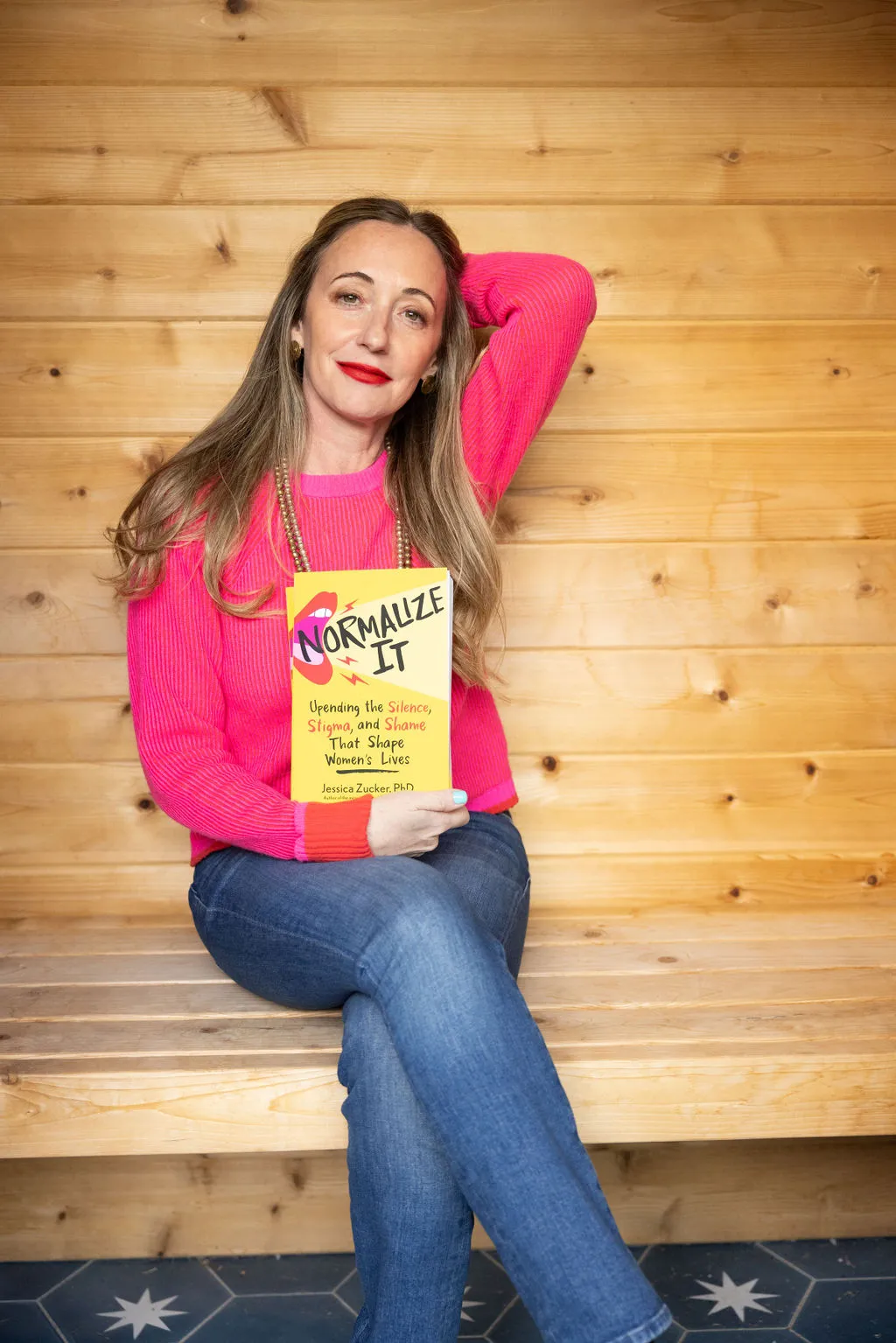There are voices that crack culture wide open—and others that help build something better from the pieces. Dr. Jessica Zucker, author of Normalize It, has done both.
Before miscarriage became a conversation on social media… before the essays, influencer captions, or branded “awareness” campaigns… there was Jessica. A clinical psychologist specializing in reproductive and maternal mental health. A scholar. A truth-teller. A woman who lost a pregnancy at sixteen weeks—and turned toward the pain, not away from it.
Her 2014 viral essay in The New York Times gave birth to the now-global #IHadaMiscarriage movement—three words that have since become a lifeline and a lighthouse for millions of grieving parents.
Her work is groundbreaking not just because it’s personal—but because it’s personal and political and clinical and literary. She brings the precision of a scientist, the heart of a mother, and the soul of a writer to every story she tells.
And her latest book, Normalize It: Upending the Silence, Stigma, and Shame That Shape Women’s Lives, is the kind of cultural reset we need now more than ever.
We sat down with Dr. Zucker to talk about shame, storytelling, grief, and how we create space to speak the unspeakable.
What inspired you to write Normalize It now?
I’ve always loved to write. That thread has followed me from childhood through grad school and into my clinical work. Normalize It is my second book, and I felt compelled to write it because the themes—silence, shame, stigma—are both timeless and urgent. My hope is that it serves as a mirror and a motivator. A guide for helping people replace outdated cultural silence with storytelling.
The book explores the journey from girlhood to womanhood, through menstruation, loss, and everything in between. It’s built around composite stories from my practice and lived experience. I wanted it to be more than memoir or theory—I wanted it to be a space for connection, reflection, and empowerment.
What does “normalizing miscarriage” look like in everyday life?
It starts with unlearning the scripts we’re handed as girls: Don’t speak up. Don’t take up space. Don’t feel too much.
Research from psychologist Carol Gilligan (who I had the honor of studying with) shows how girls don’t lose their voice—they learn to muffle it as they internalize cultural messages. That silence becomes our default.
Miscarriage, in particular, is surrounded by what I call a strident trifecta: silence, stigma, and shame. They feed each other. Silence breeds stigma. Stigma triggers shame. Shame keeps us quiet.
We need to disrupt that cycle.
One in four pregnancies ends in miscarriage, and yet many people feel completely alone in the experience. That tells us everything we need to know about the power of storytelling. When we speak up, we create a cultural shift—and a personal one. When we tell the truth, we refuse to carry shame that was never ours to hold.
What are some of the common ways society gets it wrong when talking about miscarriage?
We don’t talk about grief well, period. And especially not grief for something others couldn’t see or touch—a pregnancy that lived in our body, our heart, our dreams.
People mean well, but they often say things that hurt:
“At least you know you can get pregnant.”
“It wasn’t meant to be.”
“Everything happens for a reason.”
These phrases don’t offer support—they isolate. They push grief to the margins and reinforce the silence we’re trying to dismantle.
Instead, we need to meet people where they are. We don’t need to fix it. We just need to show up with compassion, consistency, and care.
The word “miscarriage” itself implies blame. Should we be using a different term?
Yes. Language matters—and this word is due for a change.
“Miscarriage,” when broken down, sounds like mis + carried. It places the weight of loss on the woman, emotionally and linguistically. It implies she did something wrong.
This framing is not only medically inaccurate (most miscarriages are due to chromosomal or genetic causes), it’s damaging. Research shows that many women blame themselves or feel that their body failed. Language shapes that experience.
We need terms that reflect medical reality and emotional truth—not ones that quietly reinforce shame.
What impact has the #IHadaMiscarriage movement had?
When I first wrote The New York Times essay and launched #IHadaMiscarriage in 2014, my goal was to challenge the silence—and to offer people language for their loss.
Sharing our stories online and in real life helps us integrate pregnancy loss into culture in ways that serve us. It reminds people they are not alone.
This movement isn’t just about grief—it’s about reclamation. Reclaiming our narratives, our voices, our space in the world.
What do you say to someone who’s blaming themselves after a miscarriage?
I listen. Deeply. And then I offer truth.
I share the research: 1 in 4 pregnancies end in miscarriage. Most are caused by factors beyond our control. This is not your fault.
Sometimes those facts don’t land right away—because we’ve internalized so many messages about control, perfection, and worthiness. But I often ask: What if you did absolutely nothing wrong? Just posing that question can be a powerful relief.
We deserve to stop blaming ourselves for what was never in our control. We deserve softness, science, and self-compassion.
You’ve said even as a psychologist, you weren’t prepared for what miscarriage would feel like. What do you wish you knew?
I wish I knew how deeply it would shake me.
I wish I knew that grief has no timeline. That postpartum hormones without a baby in your arms is its own kind of devastation. That pregnancy after loss would be a long, winding road of anxiety and hope.
I wish I knew how healing it would be to name the pain, to speak it out loud, and to find community in the process.
Theoretical knowledge is one thing. Living it is another. Loss rearranges us. But it also offers us the chance to rebuild—with more empathy, more softness, more connection.
What advice would you give someone who wants to share their story but fears judgment?
There is no “right” way to speak your truth.
Some people journal. Some post anonymously. Some join support groups. Others go public. The only “rule” is to honor what feels safe and supportive to you.
Yes, vulnerability can be met with misunderstanding. But it can also lead to connection, healing, and freedom.
We share our stories first for ourselves—not for the validation of others. And in doing so, we chip away at the shame that was never ours to begin with.
Final thoughts for those deep in the grief of miscarriage?
Feel what you feel. All of it.
Grief is messy, non-linear, and valid. Let yourself cry. Rage. Rest. Laugh. Mourn. Repeat.
There is no right timeline. No perfect way to grieve. Just keep showing up for yourself in the most honest way you can.
And remember:
You did nothing to deserve this.
Your story matters.
You matter.
Buy Normalize It
Follow Dr. Jessica Zucker
Instagram: @ihadamiscarriage
Website: drjessicazucker.com
If you’re reading this and want to share your own story, we’d be honored to hear from you.

Talking about miscarriage shouldn’t feel like a secret. Let’s keep pushing for change—together.
Author
-

Jenn Sinrich is the co-founder of Mila & Jo Media, an award-winning journalist and mom to Mila and Leo. She's also on-track to become a bereavement and postpartum doula to help women, like her, who've experienced pregnancy loss. She's a Peloton-tread addict who loves to cook and spend time with her friends and family. A Boston-native, she has always loved the Big Apple, which she called her home for close to a decade.
View all posts





